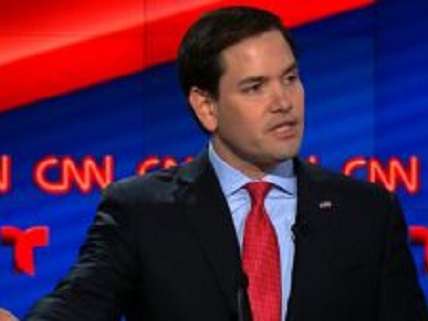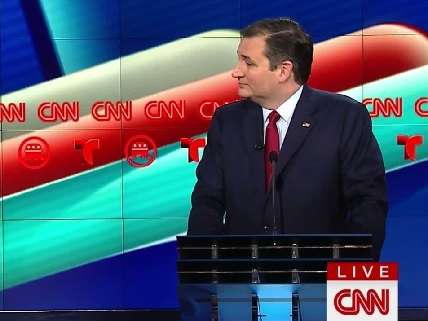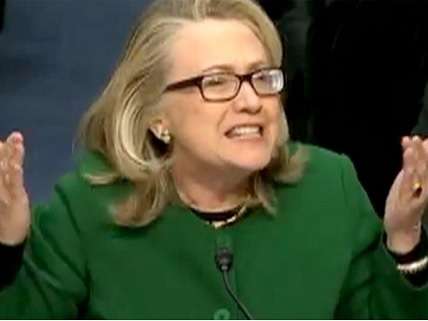No One's Going to Be Honest About Libya
At least they're talking about it?


In a way, the mainstream debate over Libya is sort of like an exercise in avoiding the passive voice. The Libyan government collapsed. Weapons spread from Nigeria to Syria. People died. You've got your subject and verb, and little about actual responsibility.
"We didn't topple Qaddafi," Marco Rubio said at last night's CNN Republican debate, referring to the ruler of Libya until a U.S.-backed intervention in the Libyan civil war. "The Libyan people toppled Qaddafi."
The only choice for President Obama, according to Rubio, was whether it was going to "happen quickly" or "take a long time." Qaddafi was caught by Libyan rebels, with U.S. air support, sodomized and killed five months after the NATO intervention started. That delay (in getting the people of Libya to topple Qaddafi) Rubio said was where "'leading from behind' came from".
Of course, the Arab spring-turned-civil war in Libya started around the same time as the one in Syria, where the dictator Bashar Assad is still clinging to power. The U.S., and U.S.-backed rebels on multiple sides of the conflict, insist he must go.
Libya came up last night, actually, in an answer from Ted Cruz about the ceasefire arranged for Syria by the U.S. and Russia, to go in effect at midnight (5pm ET) tonight in Damascus. The ceasefire is an opt-in for the warring parties on the ground.

Cruz said there was "reason to be skeptical" about the ceasefire because of Russia's strengthened position due to "Obama's weakness in the Middle East."
Cruz argued only he could "lay out a clear difference" between himself and Hillary Clinton. "So for example, in Libya, both of them agreed with the Obama/Clinton policy of toppling the government in Libya," Cruz said. "That was a disaster. It gave the country over to radical Islamic terrorism and it endangered America."
But he didn't explain how his approach to Libya (making sand glow?) would be different or yield different results. Instead, he moved on to calling John Kerry "the most anti-Israel secretary of state this country has ever seen."
Donald Trump denied he supported toppling the Qaddafi government. Cruz said he would post evidence later, but didn't offer it at the debate.
Trump supported U.S. intervention to remove Qaddafi in a 2011 video blog, saying it would be "very easy and very quick."

We could do it surgically, stop him from doing it, and save these lives," Trump said in 2011. "This is absolutely nuts. We don't want to get involved and you're gonna end up with something like you've never seen before."
Arguably, Syria fits that description, but I wouldn't expect Trump to pick up on that "told you so" moment. Would he take Rubio's route, and say it should have been done even faster and more surgically?
John Kasich, another Republican candidate for president, did bring up Syria in his answer.
"Libya didn't go down because there was some people revolution," Kasich said. "Hillary Clinton, Samantha Power and all these other people convinced the president to undermine Gadhafi. They undermined him, and now they have created a cesspool in Libya."
Now, Kasich argued, the U.S. was "gonna have to deal with" it, referring to the rise of the Islamic State (ISIS) in Libya. "Then we have ISIS in Syria, and we have ISIS in Iraq," he continued. "Because this administration has not had a strong and firm foreign policy, we are going to inherit, one of us here is going to inherit a total mess."
There was, of course, some kind of revolution in Libya, but Clinton and other liberal interventionists, like Samantha Power, did convince Obama to go along with calls from the United Nations, the European Union, and the Arab League to act in Libya. Members of Congress, including Rubio and Cruz, didn't do anything to asset their authority in the war decision-making process.
And how would a "strong and firm foreign policy" in Syria look different than Western action in Libya 2011? Topple Assad even faster? Kasich brought up Iraq too: the remaining Republicans candidates (who have something resembling policy ideas) argue that the U.S. should have remained in Iraq, which would have prevented the rise of ISIS, their way of shifting the blame from the U.S. intervention in Iraq in the first place.
Yet they also argue, as in last night's debate, that a (2011) intervention in Syria could've thwarted the rise of "radical Islamic terrorism" in that country. Yet an intervention in Libya in 2011 only helped ISIS eventually "gain a foothold" in that country. Ah, but Qaddafi was not removed quickly enough. There's no evidence the political aftermath would look much different with a few extra months of a political vacuum. Would the entire Middle East have to be occupied to prevent the rise of ISIS?

For her part, at this week's Democratic town hall Clinton touted the intervention in Libya as "the first coalition between NATO and Arab nations" and the kind of experience that qualifies her to be president. She expresses optimism about the political process in Libya, where they "actually held elections" and "elected moderates."
She mentioned "challenges internally coming from the outside with terrorist groups and other bad actors." Col. Qaddafi claimed in 2011 that Al-Qaeda would overrun Libya, saying the radical Islamists were backing many of the emerging rebels.
Clinton also blamed "internal disputes" on the continuing conflict in Libya (there are two rival governments vying for power), and said she supported current U.S. actions against ISIS in Libya. She said Libya had a "good election" and pivoted to pointing out the U.S. still had troops in places like South Korea and Germany—a similar argument to the one John McCain used in 2008 to defend keeping U.S. troops in Iraq.
Meanwhile, President Obama this week informed Congress the declaration of a "national emergency with respect to Libya" first issued five years ago would continue.
The notice repeated that the "unusual and extraordinary threat to the national security and foreign policy of the United States constituted by the actions of Colonel Muammar Qadhafi, his government, and close associates" against the people of Libya as well as the risk that he and his associates would "misappropriate" Libyan state assets necessitated the "national emergency."
"The situation in Libya continues to pose an unusual and extraordinary threat to the national security and foreign policy of the United States," the president's notice read, "and we need to protect against the diversion of assets or other abuse by certain members of Qadhafi's family and other former regime officials."
Editor's Note: As of February 29, 2024, commenting privileges on reason.com posts are limited to Reason Plus subscribers. Past commenters are grandfathered in for a temporary period. Subscribe here to preserve your ability to comment. Your Reason Plus subscription also gives you an ad-free version of reason.com, along with full access to the digital edition and archives of Reason magazine. We request that comments be civil and on-topic. We do not moderate or assume any responsibility for comments, which are owned by the readers who post them. Comments do not represent the views of reason.com or Reason Foundation. We reserve the right to delete any comment and ban commenters for any reason at any time. Comments may only be edited within 5 minutes of posting. Report abuses.
Please to post comments


I have still not gotten a specific reason for toppling Gaddafi.
"Meanwhile, President Obama this week informed Congress the declaration of a "national emergency with respect to Libya" first issued five years ago would continue.
The notice repeated that the "unusual and extraordinary threat to the national security and foreign policy of the United States constituted by the actions of Colonel Muammar Qadhafi, his government, and close associates" against the people of Libya as well as the risk that he and his associates would "misappropriate" Libyan state assets necessitated the "national emergency."
"The situation in Libya continues to pose an unusual and extraordinary threat to the national security and foreign policy of the United States," the president's notice read, "and we need to protect against the diversion of assets or other abuse by certain members of Qadhafi's family and other former regime officials."
There is no information in any of that.
I have still not gotten a specific reason for toppling Gaddafi.
It had something to do with Springtime for Arabs. There was an uprising, and for about fifteen minutes the whole thing felt kind of like Occupy Wallstreet but with more headscarves, so we needed to help.
Seems legit.
More accurately, there weren't so many headscarves because the women had to stay home because rape.
So, it felt like OW but with even more rapey goodness.
The U.S. needed a base from which to funnel weapons to the Syrian rebels, and the dart hit Libya.
Just read Hillary's released emails. Pretty much lays it out. http://levantreport.com/2016/0.....-and-gold/
"For her part, at this week's Democratic town hall Clinton touted the intervention in Libya as "the first coalition between NATO and Arab nations" and the kind of experience that qualifies her to be president. She expresses optimism about the political process in Libya, where they "actually held elections" and "elected moderates.""
Hillary Clinton operates within the accepted limits of dishonesty. /Steve Chapman
This is actually a pretty great argument from Hillary. Since all the lies she tells are lies of omission, she doesn't have to worry about the 'fact checkers' at WaPo or Politifact bothering to point out how disingenuous this is.
"Col. Qaddafi claimed in 2011 that Al-Qaeda would overrun Libya, saying the radical Islamists were backing many of the emerging rebels."
Qaddafi also told European leaders that if they helped oust him there'd be massive waves of people trying to get across to Europe by boating across the Mediterranean which would then kick off a refugee crisis.
It's a good thing he was wrong about that.
"Qaddafi also told European leaders that if they helped oust him there'd be massive waves of people trying to get across to Europe by boating across the Mediterranean which would then kick off a refugee crisis."
Really?
I seem to recall there was already a Libyan migrant-problem (at least in Italy) even when he was in charge.
this handy-dandy infographic/timeline suggests that the 'Eastern Med' was actually a greater source of migration even during in the immediate aftermath of Ghaddafi's fall
http://www.migrationpolicycent.....nt-crisis/
there was 1 year (2014) where the central-med took over as the primary route, but it seems that the seagoing-flow from Syria quintupled that in 2015.
Basically, the case that Ghaddafi's fall sparked mass migration seems pretty weak relative to the impact of the Syrian civil war/Iraq war, etc.
He definitely warned the crisis would get worse if he were to fall.
You may be right about the timeline though.
Newsflash = Presidential candidates are incoherent about foreign policy. Film @ 11.
because all voters care about is the foreign policy "attitude" - which is best summarized as 'i will not embarrass America'. Tough! but thoughtful.
Almost no one has any fucking clue what the US did do / didn't do in Libya. And fewer care.
All Dems know is that Hillary did the right thing and the mean GOP keeps bothering her, and all the GOP knows is that "if that pussy Obama weren't in charge all this shit would be done by now"
What difference at this point does it make?
as if on cue, Welch provides some dandy example of my point in the post above here
Kasich =
""'[W]hen I say regime change, I don't have to talk exactly what that means. Look, I've been involved in national security for a long time; you don't have to spell everything out. "
i.e. "look, I'm talking tough! and when prodded on specifics, I'm acting thoughtful. Now fuck off with your "But but but" questions about details and stuff, that's not how this shit works. No one cares!"
'i will not embarrass America'
This would be a refreshing change from the last seven years sixteen years twenty-eight
Oh, fuck it, how long ago was Washington in office?
What did Trump just eat before that photo?
Your mom's dick.
It was YUGE.
Well he does love the poorly educated.
OT: Time published a list of most read female writers on college campuses and had to post one of my all time favorite corrections.
"Correction: The original version of this story included Evelyn Waugh, who was a man."
Journalists are our very best thinkers and ought to be treated very seriously.
Apparently the person who wrote the article never saw Lost in Translation.
"Geez, you know, not everyone graduated from Harvard!"
The list did include the famous transexual George Elliot, so there's that consolation.
I think you're thinking of George Sand, who sadly is not on the list.
I was JK.
George really was a woman
And a *slut* = "An additional factor in her use of a pen name may have been a desire to shield her private life from public scrutiny and to prevent scandals attending her relationship with the married George Henry Lewes, with whom she lived for over 20 years.[1]"
They really should throw a bone to Thomas Hardy tho. but I don't know if anyone reads him anymore. i always felt like Tom was genuinely more 'pro-woman' than anyone else i ever came across. Shitloads more interesting than @#(*$@ jane austen.
I like Hardy, but Austen was the best.
And, yes, I know George Elliot was a really a women.
Chris Christy just endorsed Trump.
Well. Did not see that one coming.
Meanwhile, President Obama this week informed Congress the declaration of a "national emergency with respect to Libya" first issued five years ago would continue.
Is that a bit of a slap at Hillary? Kind of a "hey, everyone, remember this!"
Grab its motherfucking leg!
Wait, which lie are we discussing again?
with U.S. air support, sodomized
A-10 Wartyhog